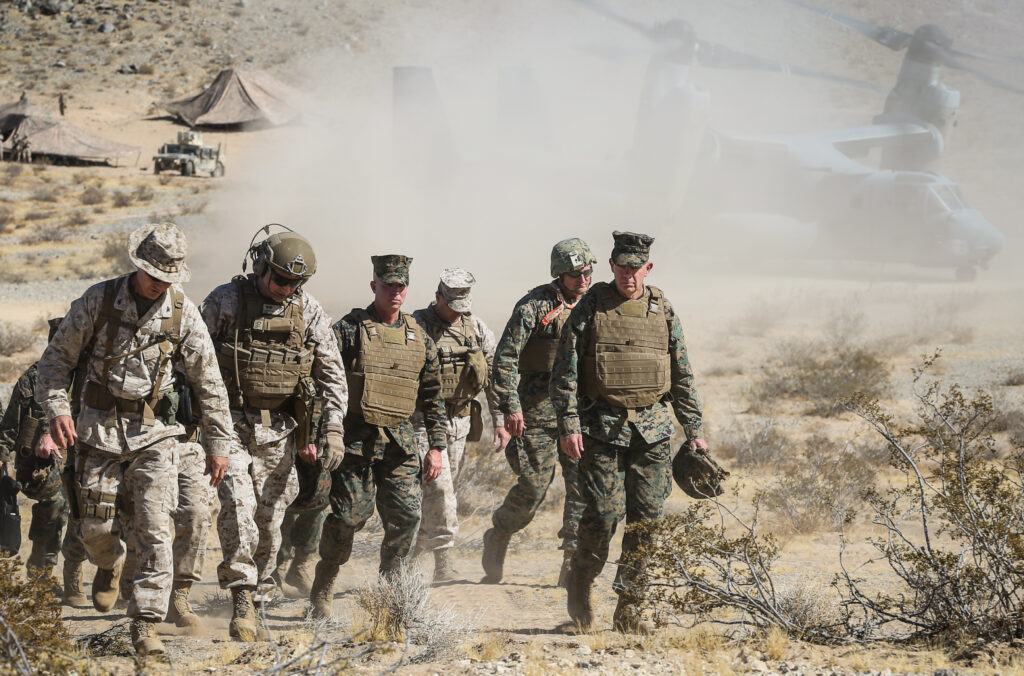
Marine Corps Commandant Gen. David Berger at Twentynine Palms.
WASHINGTON: Some 10,000 Marines just hammered away at new fighting concepts in the Corps' largest exercise since the Cold War, testing Gen. David Berger's bold new guidance to the force, the general tells Breaking Defense.
The 2nd Marine Division took on a peer enemy with similar capabilities, marking a key test of the Pentagon's push to stay ahead of the growing military prowess of China and Russia.
"What we see in this exercise is what we will expect to see in a realistic fight where large forces are spread out over great distances," Berger said in a statement to Breaking Defense. The Marines contended with degraded communications and other complicating factors, but "the imperative is to train in all warfighting domains, understanding what we look like in the electromagnetic spectrum, and evolve our noise, light and warfighting disciplines that will make us successful in battle."
The action - dubbed the Marine Air-Ground Task Force Warfighting Exercise 1-20 - played out at the Marine Corps Air-Ground Combat Center
Twentynine Palms
in California's Mojave Desert, with the North Carolina-based 2nd Marine Division squaring off against troops from the locally-based 7th and 4th Marine Regiments, along with British Royal Marines' 40 Commando Battle Group and the Royal Canadian Air Force's 408 Tactical Helicopter Squadron.
"Twentynine Palms is home to 7th Marines," Col. David Wallis, 2d Marines lead planner said in a
news release
. "It's their stomping ground, [they] will know every nook and cranny of this place."
The test was about much more than overcoming geography, however. "It's really largely about the military application of emergent technologies, the testing of developing theories, the art and science of operational design," Wallis said.
The "enemy" force was smaller than the attacking element, but were beefed up with emerging technologies allowing them to punch above their weight. Portable GPS jamming, small drone swarms, and radio frequency disruption are all meant to mimic an advanced force and make life difficult as possible for the 2nd Marine Division.
In his statement, Berger said he was looking for a sense of how Marines confront those obstacles,
adding he's ready to see everyone from lance corporals to his commanders fail, since that will be part of the process of getting better. "We must allow them to fail and learn from those mistakes," the commandant said. "Realistic training should force squad and platoon leaders to adapt to a changing environment and make decisions based upon commander's intent," while lessons learned "must feed back into improved realism and combat effectiveness going forward."
In what is viewed as a watershed moment for the Corps, Berger turned his service on its ear in July with the release of a sharply-worded guidance document. He questioned everything from the service's long reliance on amphibious ships to move his troops across long distances to demanding that the Corps become more integrated with the Navy, an idea the Navy has embraced.
Building this new Marine Corps will require "very honest assessments of our strengths and our weaknesses," Berger said last month, while "unshackling ourselves from previous notions of what war looks like and reimagining how Marines will train, how we will operate, and how we will fight."
Berger clearly has large ambitions for this reset, and has made plain he's ready to toss aside legacy equipment to so the service can develop and buy new unmanned systems, long-range fires, and other gear to allow small units to operate out of ad hoc camps in support of larger, joint campaigns.
Part of the intellectual and physical lift of the massive exercise is just that: lift.
The logistics required planners to push most of a division's worth of troops and materiel across the country from North Carolina to California using contracted tractor trailer services and rail lift, something that has proven a challenge in managing hundreds of rail cars, tractor trailer loads, and aircraft across thousands of miles.
Those shipments have nothing on any potential push to get troops and their gear across thousands of miles of open ocean prowled by Chinese submarines and ranged by long-range fires, but it might be something that would inform efforts to resupply troops by land in Europe. "Any Naval action involving Marines will inevitably involve into-, intra- and even inter-theater transport and ship-to-shore delivery," Lt. Col. Ryan Gordinier, Future Operations Planner for 2nd Marines
said
in a release.
By land or sea, however, "training with these capabilities at scale allows you to see those hidden friction points that might otherwise be missed," he said. "In other words, you don't know what you are capable of until you practice with all of your capabilities at scale and at speed."
The MWX comes as the Corps has pushed to do more training and partnering missions with allies in Australia and Europe. Earlier this month, a contingent of Marines ran Exercise Reindeer II in Norway high above the Arctic Circle, side-by-side with the Norwegian Army.
The exercise focused on "enhancing Marines' proficiency with cold-weather equipment so they can travel, survive, and enhance basic winter-warfare skills in harsh, cold-weather environments," Maj. Adrian Rankine-Galloway of Marine Corps Forces Europe & Africa told me. It also worked through the ability of Marines and Norwegian Army to communicate information and coordinate movements.